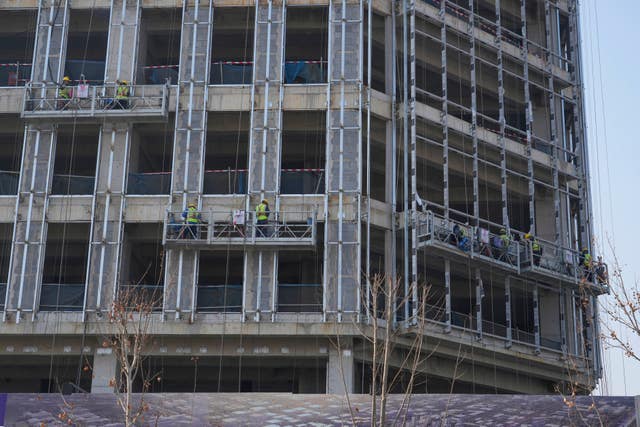
Chinese property developer Evergrande has been fined 4.2 billion yuan (£262 million) by Beijing’s stock market watchdog for allegedly falsifying its revenue, among other violations.
The company said in a release to mainland Chinese stock exchanges that its chairman, Hui Ka Yan, was fined 47 million yuan (£5.13 million) and banned from China’s markets for life.
Hui, also known as Xu Jiayin, was detained by authorities in September for suspected “illegal crimes”.
The statement cited a preliminary ruling by the China Securities Regulatory Commission, which recently got a new chief, Wu Qing, an industry veteran with a reputation for being tough on market misbehaviour.

Evergrande is the world’s most indebted property developer, with more than 300 billion dollars (£236bn) in debts. It is among dozens of Chinese companies that have collapsed since 2020 under official pressure to rein in excessive borrowing that the ruling Communist Party views as a threat to the economy.
Regulators are striving to reassure investors after Chinese markets slumped in the past year, in tandem with the downturn in the property market.
Even after regulators announced a raft of new policies to support the markets, pledging to root out insider trading and other abuses, the Shanghai Composite index is still 5.8% below its level a year earlier, and Hong Kong’s Hang Seng has fallen 15.3%.
The fallout from the property crisis has also affected China’s shadow banking industry — institutions that provide financial services similar to banks but operate outside banking regulations.
A Chinese media report said police in Beijing had detained suspects, including senior executives, in a case related to asset management company Zhongzhi Enterprise Group. Caixing Global, a financial news outlet, said the investigation aims to recover investor losses.
Zhongzhi, a conglomerate that lent heavily to developers and operates trusts, insurance, leasing and other fund management businesses, declared it was insolvent and filed for liquidation in November.
A Hong Kong court ordered Evergrande into liquidation in late January after efforts to restructure its foreign debt failed.
Real estate helped fuel China’s economic boom as families bought into one of the few potentially high-yielding assets available for investment.
But developers borrowed heavily as they turned cities into forests of apartment and office towers, pushing total corporate, government and household debt to more than 300% of the country’s annual economic output, unusually high for a middle-income country.
The government has stepped up support for the property industry, listing thousands of projects eligible for loans from state banks that are stepping up to help contain the damage. Party leaders have emphasised that they want to ensure that families are able to obtain housing they have paid for.
The notice by Evergrande said regulators found it had overstated its revenue in 2019 by 214 billion yuan (nearly £23.6 billion), or about half. In 2020, they allege its revenue was overstated by nearly 80%, or 350 billion yuan (£38.3 billion).
Hui, as chairman, was “the person in charge who is directly responsible and at the same time serves as the actual controller of the organisation and guidance”, it said. “The means were particularly bad and the circumstances were particularly serious”.
It also named and fined other Evergrande executives that it said were responsible for the falsified reports and had “behaved badly”.


Comments: Our rules
We want our comments to be a lively and valuable part of our community - a place where readers can debate and engage with the most important local issues. The ability to comment on our stories is a privilege, not a right, however, and that privilege may be withdrawn if it is abused or misused.
Please report any comments that break our rules.
Read the rules hereLast Updated:
Report this comment Cancel